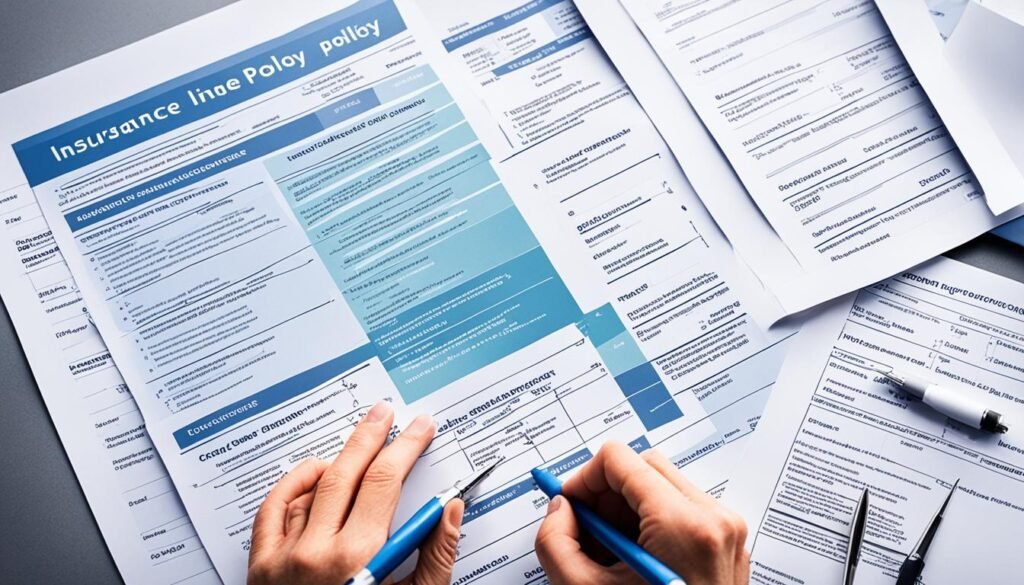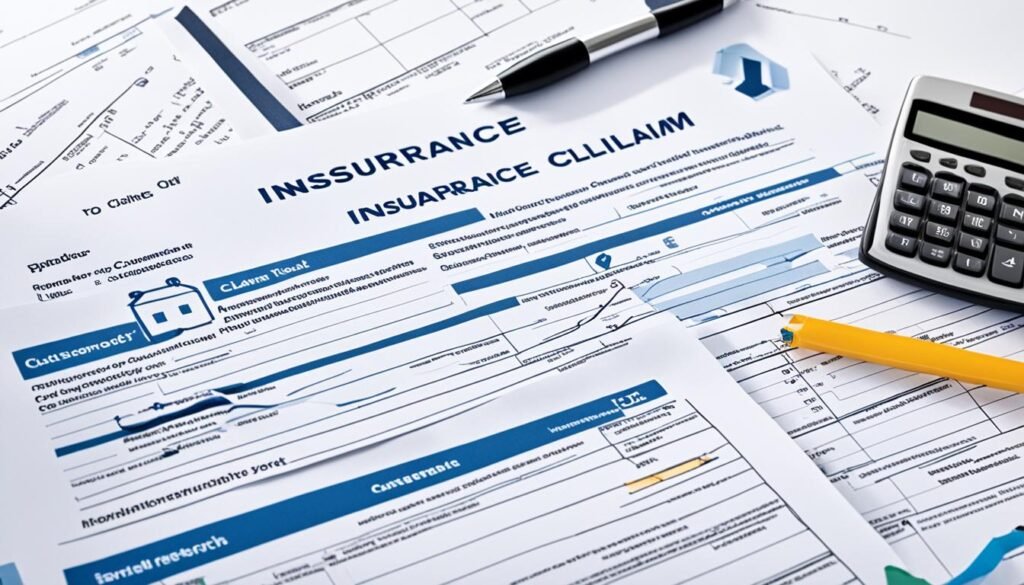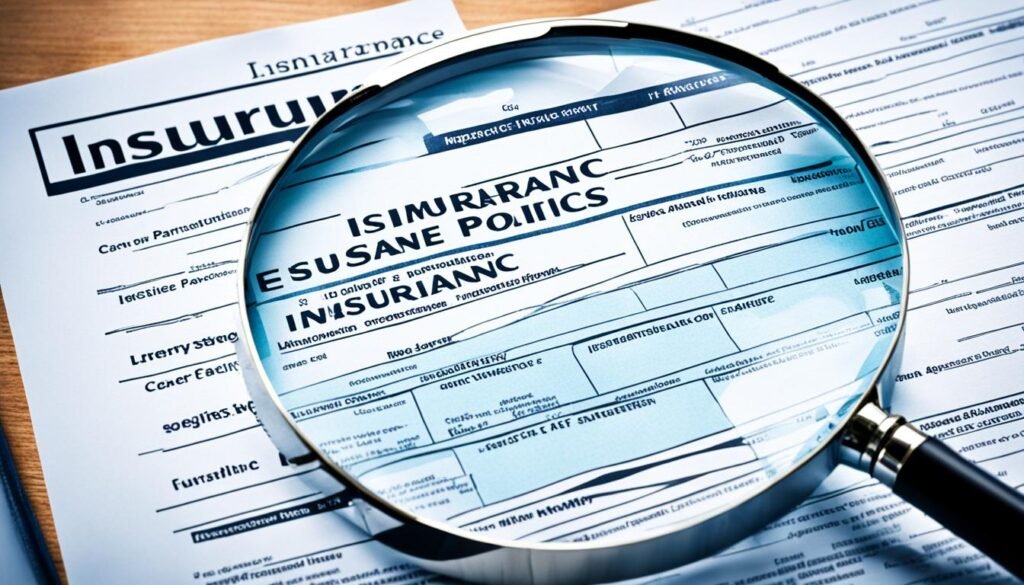Choosing the right insurance policy is key to protecting your financial future. This article will give you expert advice on understanding insurance types, figuring out what you need, and comparing providers and plans. You’ll learn how to navigate policy terms and conditions too. By the end, you’ll know how to pick the right insurance for your needs.
Key Takeaways
- Understand the various types of insurance policies, including health, life, auto, and homeowners insurance.
- Assess your coverage needs based on your life stage, financial obligations, and risk tolerance.
- Compare insurance providers and plans to find the best policy that meets your unique requirements.
- Familiarize yourself with key policy terms and conditions, such as premiums, deductibles, and exclusions.
- Evaluate the insurer’s network, covered services, and additional riders or endorsements to ensure comprehensive coverage.
Understand the Different Types of Insurance Policies
Choosing the right insurance is crucial. It involves knowing the different types of policies available. From health insurance to life insurance, auto insurance, and homeowners insurance, each policy has its own set of features and benefits. These cater to various situations and financial needs.
Health Insurance Plans
Health insurance plans include HMOs, PPOs, EPOs, and POS plans. Each type has its own rules for in-network care, referral needs, and costs for policyholders.
Life Insurance
Life insurance policies are mainly term life, whole life, and universal life. Term life covers a set period. Whole and universal life offer protection for life and can grow in value over time.
Auto Insurance
Auto insurance protects you and your car in accidents or other incidents. It covers liability, collision, comprehensive, and personal injury protection.
Homeowners Insurance
Homeowners insurance protects your home and stuff from fires, theft, and natural disasters. It also covers liability and extra living costs if your home is not safe to live in.
Knowing the details of these insurance types helps you make smart choices. It ensures you have the right coverage for your health, life, property, and finances.
Assess Your Coverage Needs

Before picking an insurance policy, it’s key to look at what you really need. Think about your life stage, money duties, and how much coverage you should get. This ensures you have the right protection for your situation.
Understand Your Life Stage and Financial Obligations
Your life stage and money duties greatly affect your insurance needs. Ask yourself questions like:
- Do you have dependents, like children or aging parents, who count on your money?
- Are you paying off debts, such as a mortgage or student loans?
- Do you need to plan for end-of-life costs, like funeral expenses or medical bills?
Determine the Appropriate Coverage Amounts
After looking at your life stage and money duties, figure out how much coverage you need. Look at your assets, emergency fund, and retirement savings to see where you might be lacking in insurance. Think about these things:
- Risk assessment: Think about the risks and liabilities you might face, like serious illness, disability, or death.
- Insurance requirements: Find out the minimum coverage you need to protect your money and your dependents’ well-being.
- Retirement savings: Make sure your insurance matches your long-term money plans, including your retirement goals.
By thinking about your life stage, money duties, and coverage needs, you can pick the right insurance policy for you.
Compare Insurance Providers and Plans

When looking for the right insurance policy, it’s key to compare providers and plans. Start by checking the network coverage of each provider. Choose insurers with a wide network of doctors, hospitals, and facilities. This ensures you can get the care you need.
Also, think about the provider’s customer service and financial strength. You want a provider that can keep their promises.
Next, look at the policy features, prices, and discounts from different insurers. Find plans that offer the coverage you need at a price you can afford. Consider the deductible, copayments, coinsurance, and policy limits to make sure you’re getting a good deal.
| Insurance Provider | Network Coverage | Customer Service Rating | Financial Strength Rating | Policy Features | Pricing | Discounts |
|---|---|---|---|---|---|---|
| ABC Insurance | Extensive | 4.8/5 | A+ | Comprehensive coverage, flexible plans | $250 – $500 per month | Multi-policy, good driver, military |
| XYZ Insurance | Limited | 3.9/5 | A | Basic coverage, limited options | $150 – $350 per month | Good driver, student |
| LMN Insurance | Moderate | 4.5/5 | A- | Customizable plans, additional riders | $200 – $450 per month | Multi-policy, employer, senior |
By comparing insurance providers and plans carefully, you can find the best coverage for your needs at a good price. Remember to look at network coverage, customer service, financial strength, policy features, pricing, and discounts. This will help you make a smart choice.
Understand the Key Policy Terms and Conditions

When picking an insurance policy, it’s key to know the main terms and conditions. These parts can greatly change your out-of-pocket costs and coverage level. Let’s look at the main policy terms you should get to know:
Premium
The premium is what you pay regularly to keep your insurance. It’s important to think about the premium cost when looking at different plans. This can greatly change your monthly or yearly costs.
Deductible
The deductible is the amount you pay before your insurance starts covering costs. If you choose a higher deductible, your premiums might be lower. But, you’ll have to pay more of the costs yourself before your insurer pays.
Copayments and Coinsurance
Copayments are set amounts you pay for certain healthcare services, like doctor visits or prescription drugs. Coinsurance is a percentage of the total cost you pay. Knowing about these can help you plan for your out-of-pocket costs.
Policy Exclusions and Limitations
Every insurance policy has exclusions and limitations that show what it doesn’t cover. Make sure to read these parts carefully. This way, you can be sure the policy covers what you need and doesn’t miss important benefits or services.
By getting to know these policy terms and conditions, you can make a smart choice. You can pick the insurance policy that gives you the best coverage limits and out-of-pocket costs for your needs.
Evaluate the Provider’s Network and Coverage

Choosing the right insurance policy means looking closely at the provider’s network of healthcare providers and facilities. This affects your costs and access to care. Make sure your doctors, hospitals, and other preferred providers are in the network.
Check for In-Network Providers and Facilities
In-network providers are healthcare professionals and places that work with your insurance. Using them can save you money on medical bills. Check the insurer’s provider network to see if your healthcare providers are there.
Review the Covered Services and Benefits
Look at the covered services and covered benefits the plan offers. This shows you what’s included and if it fits your health needs. Check on things like check-ups, specialist visits, and emergency care, and any limits or exclusions.
| In-Network Coverage | Out-of-Network Coverage |
|---|---|
| Lower out-of-pocket costs for in-network providers and in-network facilities | Higher out-of-pocket costs for out-of-network providers and out-of-network facilities |
| Access to a larger provider network and network size | Limited network accessibility and network size |
| Comprehensive covered services and covered benefits | Potential gaps in covered services and covered benefits |
Looking at the provider’s network and coverage helps you pick the best insurance for your health needs and budget.
Consider Additional Riders or Endorsements

When picking an insurance policy, think about adding riders or endorsements. These extra features can give you more protection that fits your needs. They let you tailor your coverage to your life.
The accelerated death benefit is a common rider. It lets you use part of your life insurance if you have a terminal illness. This can pay for medical bills and other costs when times are tough.
- Child life insurance riders cover your dependents. They make sure your family is financially safe if something unexpected happens.
- Disability riders give you money if you can’t work because of an illness or injury. They help you keep your lifestyle.
- Long-term care riders pay for extended medical care. This includes nursing homes or help at home if you need it later.
- A waiver of premium rider is useful. It keeps your policy active without making you pay premiums if you’re disabled.
Think about the costs and benefits of each supplemental coverage option. This way, you can make sure you have the right protection for your needs.
Shop Around and Compare Quotes

When buying insurance, it’s key to look around and compare quotes from different companies. This way, you can find the best deal for your money. You can use online platforms, private exchanges, and licensed agents to check out all your options.
Don’t accept the first quote you see. Take time to look at insurance quotes from various providers. Prices can change a lot. Think about discounts for combining policies or having a good driving record. By comparing prices, you can find a good mix of coverage and cost.
- Check out online marketplaces and private exchanges for a wide range of insurance plans and quotes.
- Use licensed insurance agents for personalized advice and special discounts.
- Don’t hesitate to negotiate or look into bundling to save more money.
| Insurance Provider | Annual Premium | Deductible | Discounts |
|---|---|---|---|
| Company A | $1,200 | $500 | 10% for bundling |
| Company B | $1,450 | $750 | 5% for good driving record |
| Company C | $1,300 | $600 | 15% for military/veteran |
By shopping around and comparing insurance quotes, you can find the right policy for your budget. Don’t just take the first option. Look at the market and use all the discounts and bundling chances to get a great deal.
Understand the Claims Process

Understanding how to handle insurance claims is key to getting the most from your policy. Before you buy coverage, learn about the claims process, what documents you need, and how long it takes. This knowledge helps you when you need to file a claim.
The claims process includes several steps:
- Filing a Claim: Tell your insurance company right after an event happens. You’ll need to fill out a claim form and provide claim documentation, like receipts or medical records.
- Claim Processing: Your insurance will look over your claim and process it. They check if you’re covered, how big the loss is, and how much you’ll get paid.
- Claim Approval or Denial: If your claim gets approved, you’ll get the money. But if it’s denied, you can appeal the decision.
- Claims Appeal: If your claim is denied, you can appeal. You’ll need to give more information or argue against the decision. Your insurance company’s customer service team can help you with this.
Knowing how the claims process works can make things easier. It helps you get through any problems and make sure you get all the policy benefits you should have.
| Key Considerations | Details |
|---|---|
| Filing a Claim | Tell your insurance company quickly and give all the needed documents. |
| Claim Processing | Your provider will check your claim and figure out how much to pay you. |
| Claim Denial | If your claim is denied, you can appeal the decision. |
| Customer Service | Ask your provider’s customer service for help with the claims process. |
Learning about the claims process prepares you to file a claim well. It helps you deal with any issues and makes sure you get all the benefits of your insurance policy.
Insurance Policy

As a policyholder, it’s key to read your insurance policy carefully. This document explains your rights, duties, and what your insurer will do. It tells you about your policy benefits, policy limitations, and exclusions.
The policy document helps you understand your insurance coverage. Look over the policy terms and conditions closely. This way, you can make sure your needs match what your insurer offers.
It’s important to know about the policy exclusions and limitations. These can include certain medical issues or activities. Knowing these can help you plan for any gaps in your insurance policy. You might need extra coverage or riders.
| Policy Term | Definition |
|---|---|
| Premium | The periodic payment you make to maintain your insurance coverage. |
| Deductible | The amount you pay out-of-pocket before your insurance coverage kicks in. |
| Copayment | A fixed amount you pay for a covered healthcare service or prescription. |
| Coinsurance | The percentage of the cost of a covered service that you pay after your deductible is met. |
Understanding your insurance policy helps you make smart choices about your policy coverage. This way, you can be sure you’re getting the right protection.
“The devil is in the details when it comes to your insurance policy. Take the time to read and understand the fine print.”
Review and Renew Policies Regularly

As your life changes, so should your insurance coverage. It’s important to regularly check your policy review and keep up with policy renewal. This ensures your insurance keeps up with your needs. Big changes like getting married, having a child, or buying a new home mean you might need to look at your coverage needs again. You might find your current policy updates don’t fit anymore.
Keeping an eye on your policy changes and renewal dates can prevent you from losing coverage. Make sure to compare your options when it’s time to renew. You might find a better plan that fits your new situation and offers more coverage at a good price.
- Regularly review your insurance policies to ensure they still meet your coverage needs
- Be proactive about renewing policies before the renewal date to avoid any gaps in coverage
- Consider how major life events, such as marriage or home purchase, may impact your insurance requirements
- Compare your current policy with other options to determine if you should renew or explore alternative plans
“Regularly reviewing your insurance policies and making necessary updates can provide peace of mind and ensure you’re adequately protected as your life evolves.”
Also Read : How Does Insurance Work In Simple Terms
Conclusion
Choosing the right insurance policy is key to protecting your financial future and feeling secure. It’s important to know the different types of insurance coverage. This helps you understand what you need and how to compare options.
Start by learning about the policy terms and conditions. Look at the provider’s network and benefits too. Think about extra riders or endorsements that could improve your financial security and risk management. Regularly check and update your policies to keep them right for your changing needs.
With these expert tips, you’re ready to find the best insurance for you. Remember, getting the right insurance policy is a smart move. It offers valuable protection and peace of mind.
FAQs
Q: What is whole life insurance?
A: Whole life insurance is a type of life insurance that provides coverage for the entire life of the insured, as long as premiums are paid. It includes a cash value component that grows over time.
Q: How does a cash value work in a life insurance policy?
A: The cash value in a life insurance policy is a savings component that grows over time. It can be borrowed against or used to pay premiums in some cases.
Q: What is a declarations page in an insurance contract?
A: A declarations page is a document in an insurance contract that provides details about the insured, the coverage limits, deductibles, and other important information about the policy.
Q: Why is long-term disability insurance important?
A: Long-term disability insurance provides financial protection in case you are unable to work due to a disability for an extended period. It can help ensure your financial security and peace of mind.
Q: What is the difference between whole life insurance and universal life insurance?
A: Whole life insurance provides coverage for life with a guaranteed cash value component, while universal life insurance offers more flexibility in premium payments and death benefits.
Q: How can I choose the right insurance policy to protect my future?
A: When choosing an insurance policy, consider factors such as your financial goals, current and future expenses, and the level of coverage you need. Consulting with an insurance broker can help you find the right policy for your needs.
Q: Why is it important to provide financial protection through insurance?
A: Insurance helps protect you and your loved ones from financial risks and uncertainties. It provides a safety net in case of unexpected events such as accidents, illness, or property damage.
Source Links
- https://www.healthcare.gov/choose-a-plan/
- https://www.nerdwallet.com/article/health/choose-health-insurance
- https://www.forbes.com/advisor/life-insurance/how-to-get-life-insurance/






